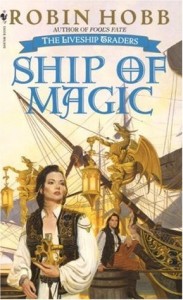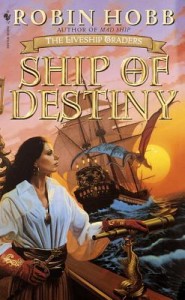 I want to start this post by saying that I adored this trilogy when I read it the first time. I remember loving it so much that I proceeded to push it on all the people that I knew at the time. My expectations were high. After my really enjoyable reread of the Farseer trilogy, they actually went up.
I want to start this post by saying that I adored this trilogy when I read it the first time. I remember loving it so much that I proceeded to push it on all the people that I knew at the time. My expectations were high. After my really enjoyable reread of the Farseer trilogy, they actually went up.
Like I experienced last month, I was surprised by how much I’d forgotten about these books. In this case, I at least remembered the characters and the beginning of the trilogy in particular, mainly because I think I read it after both the Farseer and the Tawny Man trilogies the first time. But by the time I was in the middle of the second book it was like experiencing everything again with no knowledge of what had come before. It’s honestly been a surprise to me how much reading things I thought I remembered has been like reading them for the first time. I wonder if it will stick a little bit more now that it’s been through twice, but I have enjoyed letting these books take me on the same exciting journey they did over a decade ago.
Anyway, on to this particularly trilogy. The books are set in the same world as the Farseer trilogy, but further to the south in Bingtown, a small settlement on the Cursed Shores. Bingtown governs itself through the Traders’ Council, but are subject to a larger country called Jamaillia and ruled by the Satrap. Althea Vestrit, a Trader’s daughter, is waiting to take on her father’s ship, the Vivacia; her father is unwell and on his death the liveship will awaken. After three deaths, a liveship awakens, as the wizardwood figurehead has absorbed enough life experience and memories to take on the characteristics of a member of that family. Althea has been with Vivacia for years, in the place of her brothers who died of the Blood Plague before she was born, and fully expects to guide young Vivacia through her awakening. But when Ephron Vestrit dies, nothing goes as expected, and the small saga of the Vestrit family becomes wrapped up in many larger events.
the Traders’ Council, but are subject to a larger country called Jamaillia and ruled by the Satrap. Althea Vestrit, a Trader’s daughter, is waiting to take on her father’s ship, the Vivacia; her father is unwell and on his death the liveship will awaken. After three deaths, a liveship awakens, as the wizardwood figurehead has absorbed enough life experience and memories to take on the characteristics of a member of that family. Althea has been with Vivacia for years, in the place of her brothers who died of the Blood Plague before she was born, and fully expects to guide young Vivacia through her awakening. But when Ephron Vestrit dies, nothing goes as expected, and the small saga of the Vestrit family becomes wrapped up in many larger events.
The main thing that appeals to me about this series, especially this time, is the amazing ladies who make up the cast of the books. Brave, determined Althea is still my favorite, but this time, I much more appreciated the depth and variety of the other women who make up this world. Keffria, who thought she just wanted to hide behind her husband but actually has the strength and will to take care of herself. Ronica, who has been capable all her life but has to admit her mistakes. Even Malta, starting off a spoiled and incredibly irritating girl, eventually sees the wider picture. The huge changes that take place for everyone, the way they learn and develop and change, are a big part of the book, even as the events sweep them along as much as the readers. The people who start out these books are not the same people who end them, and it feels realistic and believable.
It’s not just that, though – it’s that Robin Hobb has the ability to help you see things from so many characters’ points of view. Kyle Haven, for instance, acts in a way that is incomprehensible to many of the characters, but in his own head, his views make sense (which is disturbing as a reader). Keffria finds herself swayed along with her husband because he can argue relentlessly and act as though logic backs him up, when in reality it doesn’t. He’s a product of his culture, so even as we revile him as readers we can reluctantly understand how he ended up being that way. Malta is kind of similar to this, and in fact Althea even says she could see herself in Malta, had she been stuck in the house and forced to conform to the stereotypes of female behavior when it ill-suited her personality. I love this, and I think it’s a big reason why this trilogy is my favorite. I adore Fitz, from the other two trilogies, but I even more appreciate seeing so many viewpoints and understanding the population of this society.
 The plot, of course, is fantastic, and had me completely swept up in it, particularly in the final book. I forgot what happened so I was swept along, breathless page after page, more or less ignoring actual chores and responsibilities to read this book (who could do washing up when someone’s life is on the line??). It is wide-ranging across lots of different territories, involves king-making and romance and danger and friendship and madness and healing and so much more. It has both that appeal of a closed environment – the liveships – and the sense of a wider, varied world, along with a rich and fascinating history.
The plot, of course, is fantastic, and had me completely swept up in it, particularly in the final book. I forgot what happened so I was swept along, breathless page after page, more or less ignoring actual chores and responsibilities to read this book (who could do washing up when someone’s life is on the line??). It is wide-ranging across lots of different territories, involves king-making and romance and danger and friendship and madness and healing and so much more. It has both that appeal of a closed environment – the liveships – and the sense of a wider, varied world, along with a rich and fascinating history.
The only part that I felt was somewhat less appealing was the sections about the serpents. They’re important, but they’re infrequent and mostly consist of searches for She Who Remembers and various worries about how they haven’t found her and are starving. But this is a very small part of a series of books that consumed my thoughts and culminated in a very happy reader.
With that, I’ll stop gushing; but if epic fantasy is something you enjoy, and you haven’t read this trilogy yet, you should. No real need to read the Farseer trilogy first, but of course, they do loosely tie together and are actually chronologically immediately after in terms of the wider world story, so I would recommend it. I’m so glad I’m still loving these books just as much as I did the first time.









Recent Comments